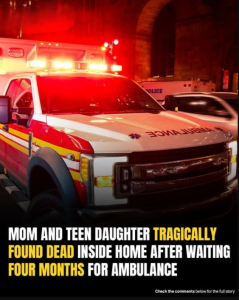📅 1. What Happened: Timeline & Discovery
-
On February 2, 2024, Alphonsine Djiako Leuga, aged 47, dialed 999 from her home in Radford, Nottingham. She was suffering from sickle cell anaemia and reported she felt cold, was immobile, and desperately needed help—for both herself and her daughter. She even pleaded, “I need help to my daughter… I feel cold and can’t move.” She provided her address before the call ended
-
Crucially, no ambulance was dispatched. The call handler misinterpreted the call as abandoned and closed it, despite having the caller’s address and symptoms
-
They were finally discovered dead on May 21, 2024, in their home—nearly four months later. Their bodies were discovered only after a neighbor noticed windows open and a foul odor
2. The Victims: Alphonsine & Loraine
-
Alphonsine Djiako Leuga (47) lived with serious sickle cell anaemia. In late January 2024, she was admitted to hospital for a blood transfusion due to critically low iron levels—but was discharged after two days, under a “pragmatic discharge” decision so she could care for her daughter
-
Her daughter, Loraine Choulla (18), had Down syndrome and learning disabilities, and was entirely dependent on her mother for basic needs such as food, hydration, and personal carePrior to these events, social isolation had increased: Alphonsine withdrew Loraine from school and limited access to support services out of fear they might lose custody
3. The Neglected 999 Call: What Was Said & What Went Wrong
-
During the emergency call, Alphonsine gave her exact address, described her condition, and made clear the need for help. Yet, the call was labeled “abandoned” after one callback attempt failed—resulting in no emergency response
-
East Midlands Ambulance Service’s Susan Jevons, head of patient safety, testified that once the dispatcher had the address, the call should have triggered a response; however, “the emergency medical adviser, thinking it was an abandoned call, closed the call down… it wasn’t visible to anybody within the emergency operations centre
-
The Nottingham Assistant Coroner, Amanda Bewley, stated that dispatching an ambulance might have been the difference between life and death for Loraine. She expressed clear conviction that if help had come, Loraine would likely still be alive
4. Medical Findings & Probable Causes of Death
-
Alphonsine’s cause of death was ruled as pneumonia of uncertain cause, likely occurring in early February 2024 and possibly on the day she made the call
-
Loraine’s cause of death remains medically unascertained. However, due to her complete dependency and the reports of dehydration and weight loss, it was suggested she likely died from malnutrition or dehydration days or weeks after her mother’s passing
-
Dr. Stuart Hamilton, the pathologist, noted they were likely deceased for “weeks to months” before discovery. He emphasized that the cause of Loraine’s death being unascertained does not rule out dehydration or malnutrition
5. Family Situation & Social Context
-
Alphonsine had lived in isolation: she refused social services’ visits, discontinued home inspections (leading to gas supply being turned off in 2023), and withdrew Loraine from school over alleged concerns of neglect
-
Their eldest daughter, Elvira, last visited them in November 2023. She noticed the home was dark and silent by early 2024 but was told by a friend that they had been seen in February, so she didn’t report them missing
-
By the time authorities intervened, the home was in decay—filled with moldy food and dimly lit—the deterioration evidence of prolonged isolation
6. Inquest & Response from Authorities
-
The inquest began on July 21, 2025, spanning approximately five days at Nottingham Coroner’s Court, to explore the multiple failures and missed opportunities
-
Coroner Bewley reiterated that emergency services’ failure to dispatch ambulance “should never have happened” and emphasized the tragic outcome was avoidable with proper protocol
-
In response, East Midlands Ambulance Service issued an apology and accepted the Coroner’s findings. They stated they had since made changes to policies, procedures, and training to prevent recurrences
-
Nottingham City Council also pledged to review and improve safeguarding policies. They stated they were working to embed lessons across services and expressed condolences to the family
7. Key Themes & Lessons
🚨 Emergency Response Failures
A catastrophic breakdown in call handling, where a caller in dire need was dismissed without care or follow-up.
👩👧 Vulnerable Dependency
Loraine’s complete reliance on her mother underscores how Sheffield’s social care and outreach systems failed to protect those most in need.
🕯 Systemic Isolation & Fear
Alphonsine’s fear of losing her daughter contributed to a refusal of external help, limiting oversight and intervention.
🕰 Time Lost = Lives Lost
Had any link in the chain—hospital follow-up, dispatcher response, social services—functioned properly, this outcome could have been prevented.
🧾 Accountability and Reform
The inquest’s findings and public acknowledgment by authorities are crucial first steps. But they also highlight systemic gaps in training, response classification, and welfare checks.
8. Summary Table
| Category | Details |
|---|---|
| Date of 999 call | February 2, 2024 |
| Location | Hartley Road, Radford, Nottingham |
| Caller | Alphonsine Djiako Leuga (47), with Loraine Choulla (18) |
| Medical Condition | Alphonsine: Sickle cell anaemia; Loraine: Down syndrome, learning difficulties |
| Call details | Caller said she felt cold, immobile, requested help for daughter |
| Response | Call closed as ‘abandoned’; no ambulance sent |
| Discovery of bodies | May 21, 2024 |
| Cause(s) of death | Alphonsine: pneumonia; Loraine: unascertained (likely dehydration/malnutrition) |
| Duration of inquest | Began July 21, 2025; ongoing five-day hearing |
| Outcome & changes | Ambulance service issued apology; policy and training reforms underway |
| Systemic issues | Breakdown in 999 handling, social service withdrawal, isolation |
9. Final Thoughts
This case is profoundly disturbing yet important to understand deeply. A mother in crisis—Alphonsine—managed to make one last call for help and rumored to be dying when calling. But due to procedural missteps, there was no emergency response. Her daughter, entirely dependent on her, survived alone in the home for weeks, eventually succumbing without aid.
It exposes failures at many levels:
-
Emergency dispatch protocols (mislabeling a valid 999 call)
-
Lack of follow-up after hospital discharge
-
Social isolation due to fear of losing custody
-
Systemic oversight breakdown by multiple agencies
The inquest’s findings call for full accountability—and, more importantly, demonstrate the need for urgent reforms in how emergency calls are handled, how vulnerable individuals are monitored, and how social care systems engage with families reluctant to seek help.
Above all, this tragedy underscores how, in emergency response, every missed call, every procedural misstep, every unchecked concern can become a matter of life and death.


